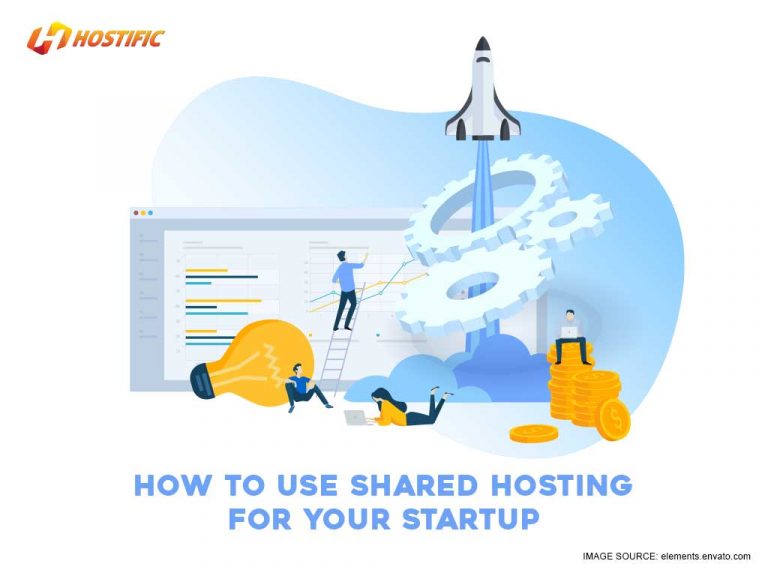A huge part of your startup’s online presence is your website. It helps establish your startup as a credible business, and it gives you access to clients online – some of whom will never even set foot in your startup’s physical location. But before you start thinking about web design and how you’re going to make sure your website reflects your brand’s story, it’s important to figure out where you’re even going to put your website and how you’re going to secure it against hackers and human error.
In this article, you’ll get our best tips on how to get the most out of your web hosting, so your website stands out, keeps your data safe, and doesn’t drain your bank account.
Table of Contents
Shared hosting is a great choice for startups
Let’s be honest: When you think about your website, you’re not really thinking about how you’re going to host it. You’re mostly thinking about how you’re going to get it to funnel sales and establish brand loyalty.
But you have to host your website somewhere. Your website needs to be on a server, but there’s no reason to choose the most expensive one. It’s actually in your startup’s best interests to choose cheap web hosting.
Spending lots of money on web hosting services isn’t smart when you have other things you need to invest in for your startup – especially since you’re just starting out and likely don’t have tons of web traffic yet.
Your best bet when you’re just starting out is to go with shared hosting, and then when your business starts expanding (and your site starts getting more visitors), you can scale up.
Shared hosting isn’t cheap web hosting just for the sake of being cheap – it’s the most efficient way to use your money. The best web hosting packages will even throw something in when you choose shared hosting. (Hostific gives you shared web hosting with cPanel thrown in for free!)
If you can, get web hosting with cPanel
We don’t blame you if you’ve never heard of cPanel before today, but if you’ve been researching web hosting services for a while, you’ve probably heard of it a million times by now, even if you’re not exactly sure what it does. (The best web hosting packages will usually offer cPanel.)
cPanel – which stands for control panel – is a user-friendly dashboard that lets you manage your web server by giving you control over things like your website’s interface, databases, file creation, spam filter, autoresponder, and all the little moving parts that keep your website running smoothly.
Without cPanel, you’d need to have pretty good technical knowledge to manage your website. cPanel makes it so you can do even fairly complex web management tasks in just a few clicks.
Getting web hosting with cPanel makes it easy to manage your website yourself, so everything looks exactly the way you want it to, and you won’t have to spend months learning website management from scratch.
Getting cheap web hosting doesn’t mean your website should look cheap
If you want customers to spend their money with your brand, your website needs to look trustworthy. A website that looks like a teenager’s IT project won’t inspire confidence in anyone. Everything, from your catchy, easy-to-remember domain name, to your web design, should work together to make your website look expensive.
But you run a business, so you want the website-creation process to be as smooth and painless as possible. You don’t have time to learn the finer points of web design.
A website builder makes it easy to create a beautiful website that looks like you hired a web design team.
If you want to make your website stand out, start with a gorgeous template and add your own little touches to make it true to your brand. Your website works with your social media and email to create your brand’s online persona. Don’t waste the opportunity to craft a compelling brand story. Make sure your brand’s message and mission are consistent across all your social media platforms as well as your website.
This includes the copy (written words – the “voice” of your brand) and the design of your website, so it’s important to use your website builder strategically.
But looks aren’t the only things that matter when it comes to creating your website.
You also need secure web hosting
More than 30,000 websites get hacked every day.
So, the best web hosting packages will always make sure you get secure web hosting.
If you lose the client data you collected through your website, there goes all the goodwill you worked so hard to build for your startup. Secure web hosting should be your top priority if you plan to do any business at all through your website.
When you’re looking for web hosting services, search the companies’ websites to make sure they offer website backup.
How does website backup work?
A website backup is kind of like a duplicate of your website, and it’s important to have it in case something happens to your “real” website. It minimizes the time you need to get your site up and running again in case the worst happens.
It might seem like spending money on website backups shouldn’t be a priority at this stage in your business. (“What hacker is going after my startup when there are bigger, more established brands to steal data from?”) But hackers attack websites of various sizes, for various reasons. And hacking isn’t the only thing that can cause data loss. Someone on your team could make a mistake that deletes all your data, or your site might start glitching out after a normal update.
The point is that these kinds of things are unpredictable. Better to invest in keeping your website safe than to lose all the time you spent perfecting your website and collecting data from your clients.
You’ll know website security is important to your hosting service provider if they give you the option to plan your own website backups periodically.
It’s important to perform website backups about as often as you add new content to your website. This means if you add new data of any kind to your website every day, you need to back up your website every day.
Wrap-up
Your website needs to do lots of things for your startup: It’ll introduce your brand to new clients, tell existing clients about new products, and establish the credibility of your business.
Startups have a hard enough time competing with bigger, more established businesses. Level the playing field online by choosing a web hosting provider that makes it easy to create a beautiful, secure website.






